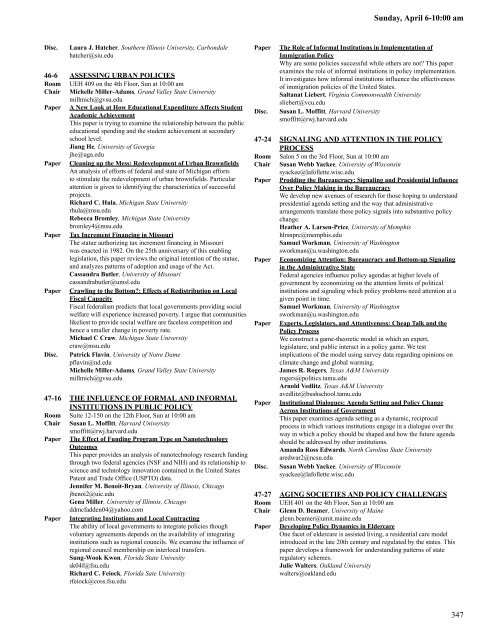2008 Conference Program - Midwest Political Science Association
2008 Conference Program - Midwest Political Science Association
2008 Conference Program - Midwest Political Science Association
Create successful ePaper yourself
Turn your PDF publications into a flip-book with our unique Google optimized e-Paper software.
Sunday, April 6-10:00 am<br />
Disc.<br />
Laura J. Hatcher, Southern Illinois University, Carbondale<br />
hatcher@siu.edu<br />
46-6 ASSESSING URBAN POLICIES<br />
Room UEH 409 on the 4th Floor, Sun at 10:00 am<br />
Chair Michelle Miller-Adams, Grand Valley State University<br />
millmich@gvsu.edu<br />
Paper A New Look at How Educational Expenditure Affects Student<br />
Academic Achievement<br />
This paper is trying to examine the relationship between the public<br />
educational spending and the student achievement at secondary<br />
school level.<br />
Jiang He, University of Georgia<br />
jhe@uga.edu<br />
Paper Cleaning up the Mess: Redevelopment of Urban Brownfields<br />
An analysis of efforts of federal and state of Michigan efforts<br />
to stimulate the redevelopment of urban brownfields. Particular<br />
attention is given to identifying the characteristics of successful<br />
projects.<br />
Richard C. Hula, Michigan State University<br />
rhula@msu.edu<br />
Rebecca Bromley, Michigan State University<br />
bromley4@msu.edu<br />
Paper Tax Increment Financing in Missouri<br />
The statue authorizing tax increment financing in Missouri<br />
was enacted in 1982. On the 25th anniversary of this enabling<br />
legislation, this paper reviews the original intention of the statue,<br />
and analyzes patterns of adoption and usage of the Act.<br />
Cassandra Butler, University of Missouri<br />
cassandrabutler@umsl.edu<br />
Paper Crawling to the Bottom: Effects of Redistribution on Local<br />
Fiscal Capacity<br />
Fiscal federalism predicts that local governments providing social<br />
welfare will experience increased poverty. I argue that communities<br />
likeliest to provide social welfare are faceless competition and<br />
hence a smaller change in poverty rate.<br />
Michael C Craw, Michigan State University<br />
craw@msu.edu<br />
Disc. Patrick Flavin, University of Notre Dame<br />
pflavin@nd.edu<br />
Michelle Miller-Adams, Grand Valley State University<br />
millmich@gvsu.edu<br />
47-16 THE INFLUENCE OF FORMAL AND INFORMAL<br />
INSTITUTIONS IN PUBLIC POLICY<br />
Room Suite 12-150 on the 12th Floor, Sun at 10:00 am<br />
Chair Susan L. Moffitt, Harvard University<br />
smoffitt@rwj.harvard.edu<br />
Paper The Effect of Funding <strong>Program</strong> Type on Nanotechnology<br />
Outcomes<br />
This paper provides an analysis of nanotechnology research funding<br />
through two federal agencies (NSF and NIH) and its relationship to<br />
science and technology innovation contained in the United States<br />
Patent and Trade Office (USPTO) data.<br />
Jennifer M. Benoit-Bryan, University of Illinois, Chicago<br />
jbenoi2@uic.edu<br />
Gena Miller, University of Illinois, Chicago<br />
ddmcfadden04@yahoo.com<br />
Paper Integrating Institutions and Local Contracting<br />
The ability of local governments to integrate policies though<br />
voluntary agreements depends on the availability of integrating<br />
institutions such as regional councils. We examine the influence of<br />
regional council membership on interlocal transfers.<br />
Sung-Wook Kwon, Florida State Univesity<br />
sk04f@fsu.edu<br />
Richard C. Feiock, Florida Sate University<br />
rfeiock@coss.fsu.edu<br />
Paper<br />
Disc.<br />
The Role of Informal Institutions in Implementation of<br />
Immigration Policy<br />
Why are some policies successful while others are not This paper<br />
examines the role of informal institutions in policy implementation.<br />
It investigates how informal institutions influence the effectiveness<br />
of immigration policies of the United States.<br />
Saltanat Liebert, Virginia Commonwealth University<br />
sliebert@vcu.edu<br />
Susan L. Moffitt, Harvard University<br />
smoffitt@rwj.harvard.edu<br />
47-24 SIGNALING AND ATTENTION IN THE POLICY<br />
PROCESS<br />
Room Salon 5 on the 3rd Floor, Sun at 10:00 am<br />
Chair Susan Webb Yackee, University of Wisconsin<br />
syackee@lafollette.wisc.edu<br />
Paper Prodding the Bureaucracy: Signaling and Presidential Influence<br />
Over Policy Making in the Bureaucracy<br />
We develop new avenues of research for those hoping to understand<br />
presidential agenda setting and the way that administrative<br />
arrangements translate these policy signals into substantive policy<br />
change.<br />
Heather A. Larsen-Price, University of Memphis<br />
hlrsnprc@memphis.edu<br />
Samuel Workman, University of Washington<br />
sworkman@u.washington.edu<br />
Paper Economizing Attention: Bureaucracy and Bottom-up Signaling<br />
in the Administrative State<br />
Federal agencies influence policy agendas at higher levels of<br />
government by economizing on the attention limits of political<br />
institutions and signaling which policy problems need attention at a<br />
given point in time.<br />
Samuel Workman, University of Washington<br />
sworkman@u.washington.edu<br />
Paper Experts, Legislators, and Attentiveness: Cheap Talk and the<br />
Policy Process<br />
We construct a game-theoretic model in which an expert,<br />
legislature, and public interact in a policy game. We test<br />
implications of the model using survey data regarding opinions on<br />
climate change and global warming.<br />
James R. Rogers, Texas A&M University<br />
rogers@politics.tamu.edu<br />
Arnold Vedlitz, Texas A&M University<br />
avedlitz@bushschool.tamu.edu<br />
Paper Institutional Dialogues: Agenda Setting and Policy Change<br />
Across Institutions of Government<br />
This paper examines agenda setting as a dynamic, reciprocal<br />
process in which various institutions engage in a dialogue over the<br />
way in which a policy should be shaped and how the future agenda<br />
should be addressed by other institutions.<br />
Amanda Ross Edwards, North Carolina State University<br />
aredwar2@ncsu.edu<br />
Disc. Susan Webb Yackee, University of Wisconsin<br />
syackee@lafollette.wisc.edu<br />
47-27 AGING SOCIETIES AND POLICY CHALLENGES<br />
Room UEH 401 on the 4th Floor, Sun at 10:00 am<br />
Chair Glenn D. Beamer, University of Maine<br />
glenn.beamer@umit.maine.edu<br />
Paper Developing Policy Dynamics in Eldercare<br />
One facet of eldercare is assisted living, a residential care model<br />
introduced in the late 20th century and regulated by the states. This<br />
paper develops a framework for understanding patterns of state<br />
regulatory schemes.<br />
Julie Walters, Oakland University<br />
walters@oakland.edu<br />
347










